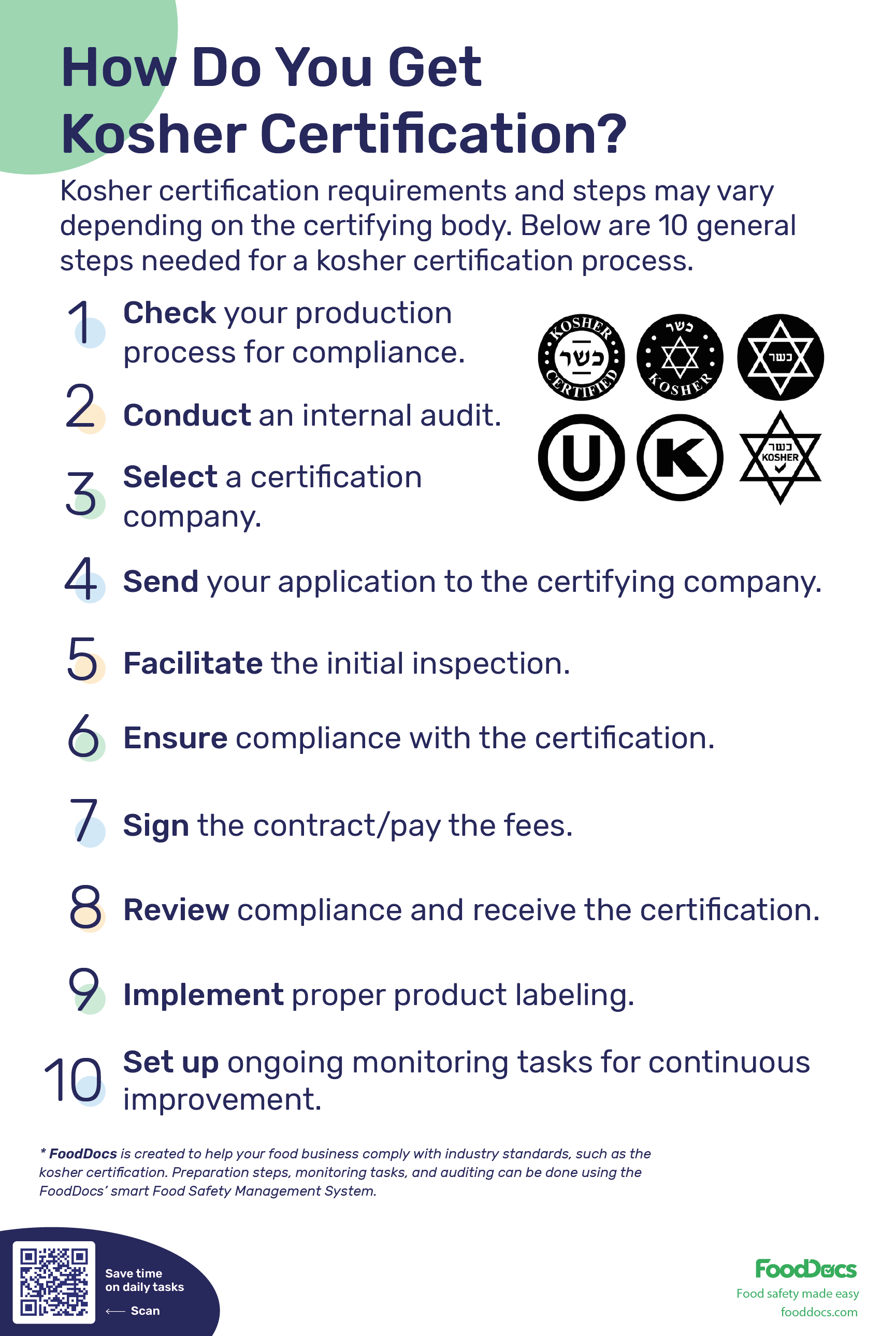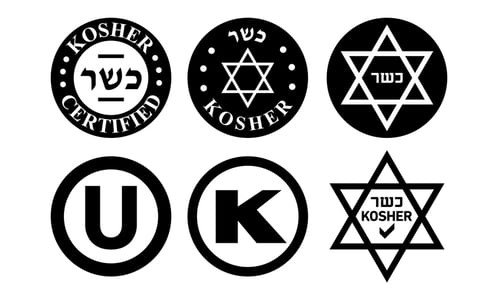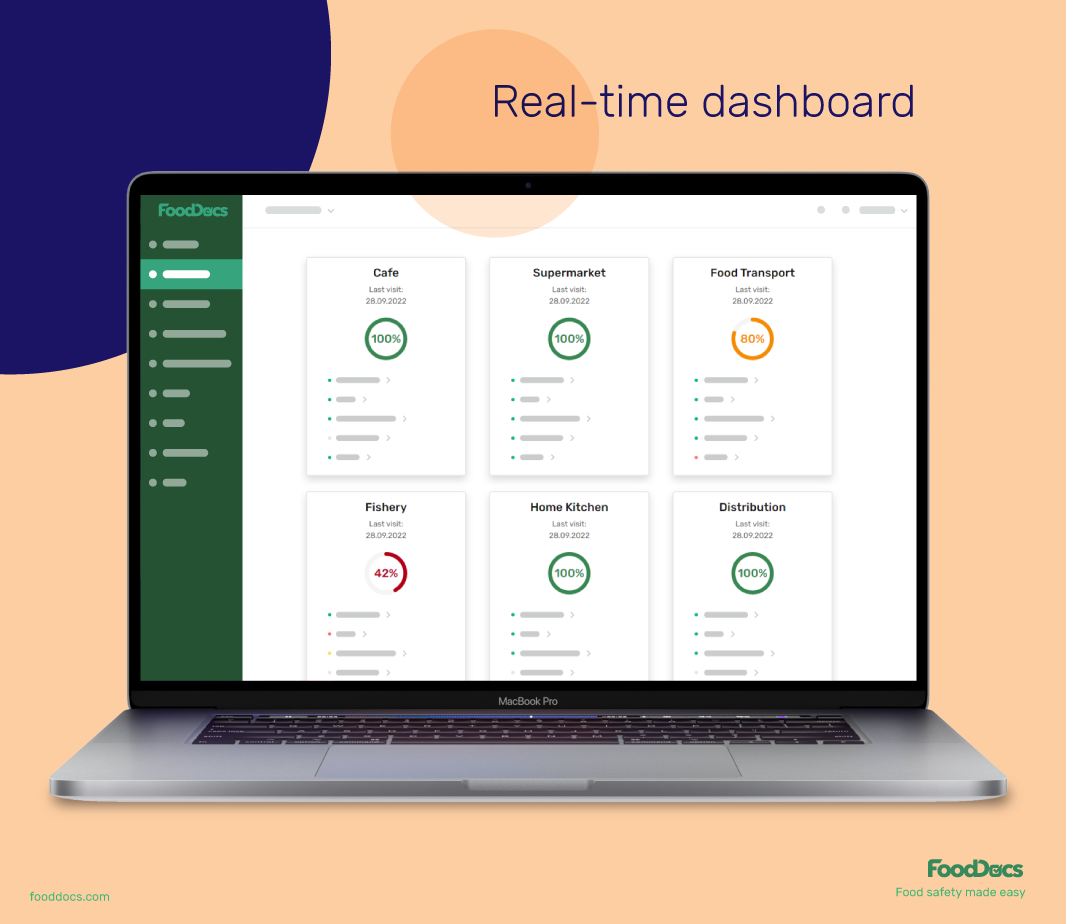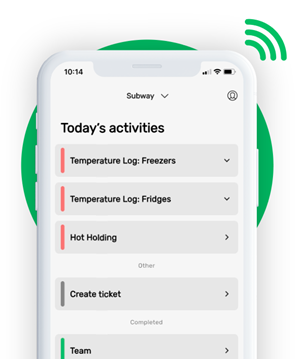KOSHER CERTIFICATION POSTER


This is how our Digital Food Safety platform saves 20% of your time on daily tasks:
- Get upcoming task notifications
- Add data into the app
- Check the status of tasks in real-time

When food safety was still handled on paper, I typically spent a couple of hours per day getting the papers and going around checking or completing tasks… Now I can sit down and it's just all there in one place. It takes me 5-10 minutes.
Ruth B.
Store Manager
Over 12 million people purchase kosher products every year in the United States. Three in five people purchase these products for food quality, safety, or general healthfulness, not because they're part of the Jewish community. This means that kosher food has never been more popular.
But it also means that companies that haven’t yet become kosher-certified are losing out and will benefit from kosher certification. Wondering how to initiate the kosher certification process? Let’s break it down.
Key points covered:
- Over 12 million people in the U.S. purchase kosher products annually, with many buying for reasons other than religious adherence, such as food quality and health.
- Kosher certification is a voluntary process confirming that food products and manufacturing processes comply with Jewish dietary laws. Products are marked with a hechsher symbol indicating their kosher status and category.
- There are four main types of kosher certification: Standard, Mehadrin, 365-Day Certified, and Certified Passover, each with varying levels of stringency and application.
- To be kosher-certified, every ingredient, additive, and equipment used must be kosher. Requirements can differ, as kosher certification agencies are privately regulated without universal standards.
- The certification process includes a compliance audit, selecting a certification agency, application submission, initial inspection, compliance with agency recommendations, finalizing the application, and receiving certification.
- Our checklist helps businesses navigate the complex certification process, ensuring that no important steps are missed.
- Understanding and applying the checklist involves identifying relevant regulations, conducting ingredient analysis, reviewing and modifying production processes, employee training, and establishing a traceability system.
- The cost of certification varies based on the agency, the complexity of products and processes, and oversight requirements, generally ranging from $1,500 to $50,000.
- Typically, kosher certificates are valid for one year, requiring annual renewal and compliance inspections.
- FoodDocs offers two-in-one traceability to help you keep your entire food chain kosher, which is an important requirement for kosher certification.
WHAT WE'LL COVER:
- What is kosher certification?
- The types of kosher certification
- Kosher certification requirements
- Steps for becoming kosher-certified
- What a kosher certification checklist is
- How to use our kosher certification checklist
- The cost of kosher certification
- When to renew your kosher certification
- How FoodDocs can help with kosher certification
- Frequently Asked Questions
What Is Kosher Certification?

A kosher certification is a voluntary standard that confirms your food products and ingredients meet the standards of Jewish dietary law. It also guarantees that the equipment used during the manufacturing and production processes meets kosher laws.
Each kosher-certified product is marked with a hechsher symbol that shows its kosher status and food type, such as fish, dairy ingredients, meat, kosher pareve, or Passover. This alerts customers to any specific kosher category a food product might fall under.
What Are the Kosher Certification Types?
Kosher certifications have four types:
- Standard – This type is offered for each ingredient and food product, such as cRc letters of certification and OK Kosher Certificates.
- Mehadrin – This is offered by a few certification agencies like Star-K and has extremely strict standards.
- 365-Day Certified – These certifications are valid for one year, such as those offered by OK. They can apply to any food ingredient or product.
- Certified Passover – This authorizes a company to sell food products for Passover. It includes certifications by cRc, Kof-K, OK, and OU.
What Are Kosher Certification Requirements?
For a product to be kosher certified, each food ingredient, additive, processing aid, and piece of equipment has to be kosher. Since manufacturing and production processes differ across companies, this requires a tailored process for every company.
Moreover, kosher certification agencies are privately regulated, which means there are no government-mandated, universal requirements for getting a kosher certification. But most kosher agencies -- such as AKC Kosher, EarthKosher Kosher Certification Agency, KSA Kosher, and Kosher Supervision of America -- ask for the following requirements to be fulfilled:
- Using kosher ingredients, additives, and equipment.
- Ensuring food items don’t come into contact with non-kosher products, equipment, and production units.
- Not using animal derivatives like casein, rennet, or gelatine because these are non-kosher.
- Preventing the combination of meat and dairy products.
- Serving food in a kosherized environment.
- Only using meat from kosher species that have been ritually slaughtered, soaked (to remove blood), and salted. These animals must also chew the cud and have split hooves.
Aside from the above, companies should also ensure they’re at least partly non-Jewish owned. This is because Jewish law doesn’t permit Jewish-owned companies to produce grain-derived products during Passover.
What Are the Steps to Getting a Kosher Certification?
The kosher certification process is complex and requires meeting strict requirements. Let’s break it down:
1. Perform a Compliance Audit
Before applying for a kosher certificate, you need to determine whether your current production process complies with the kashruth, the Jewish dietary law.
If you’re already complying with basic kosher laws, you don’t need to make any changes. But if you aren’t, start implementing them. This can include switching to kosher ingredient manufacturers or producers and will make the compliance process easier.
2. Find a Certification Company
Once you’ve met basic kosher requirements, you need to find a certification agency that’s right for you. For instance, if you’re a restaurant or eatery looking to get kosher certified, you might need to go with a smaller, more specific certification agency instead of the big five.
The easiest way to find such agencies is through consultants and kosher companies like the Chicago Rabbinical Council (cRc).
3. Send an Application
After you’ve found an agency that you think is a good fit, you need to send them an application using an online form, written PDF, or fax.
This is usually free and should include your plant profile, company profile, raw material listing, and written product approval request.
4. Arrange for an Initial Inspection
Once your application has been received, a rabbi will visit your plant or production unit and look at your premises, production line, and people. This will help them determine whether your processes comply with Jewish dietary laws.
They’ll report their kosher supervision findings to a senior rabbi at the compliance agency once the inspection is complete.
5. Comply with the Agency Recommendations
After reviewing your application, your kosher certifier will outline the requirements you need to meet for kosher compliance. This may require making complex changes to your production process.
Once that’s done, you’ll need another audit before moving on to the next phase.
6. Finalize Your Application
Once you’ve met all the certification requirements, you need to sign a contract specifying the materials you’re using, your product designations, requirements, and any fees you need to pay.
Your contract will also list the responsibilities of your kosher supervisors. This may include providing any updates about changes in compliance requirements and conducting a periodic kosher check.
7. Receive the Certification
After you sign the contract and pay the fee, you’ll be issued your kosher letter and a list of hechshers you have to use on your products.
You’ll also need to run your new packaging labeled with kosher symbols by your certification agency to ensure it complies with the auditor’s requirements. Once you pass this check, you can begin using the kosher symbol for advertising purposes.
What Is a Kosher Certification Checklist?
A kosher certification checklist outlines the steps needed to become kosher-certified. Kosher certification is a long and complex process, especially if your business is new and your operations are not as robust and established yet.
A kosher certification checklist ensures that you don't miss out on any of the important steps involved in the process. This can help you save time and money and keep the entire journey streamlined.

How to Use a Kosher Certification Checklist to Get Certified?
Now that you know what goes into getting kosher certified, let’s see how you can use our checklist to make the process easier.
1. Understand the Checklist
Before jumping into the process, understand our kosher certification checklist. Familiarize yourself with each item on the checklist to ensure a clear understanding of the specific requirements you need to fulfill.
It might be a good idea to print out the checklist and distribute it to your kosher certification project team.
2. Identify Applicable Regulations and Standards
Kosher certification requirements may vary based on the certifying authority and the nature of your food production. Plus, different religious denominations may have specific interpretations of kosher laws.
While our checklist is a general one, you want to identify the relevant regulations and standards that apply to your product or facility. This might take a while.
3. Conduct a Thorough Ingredient Analysis
Go through the ingredients used in your products to ensure that each complies with kosher dietary laws.
You should consider the origin of meat, the absence of forbidden additives, and the proper separation of meat and dairy ingredients. This step is critical, as any non-kosher ingredient can jeopardize the entire certification process.
4. Review and Modify Production Processes
Examine your production processes to make sure that all steps align with kosher requirements. This includes equipment used, handling procedures, and the prevention of cross-contamination between meat and dairy items.
You should make any necessary modifications to your processes to meet kosher standards and document these changes for future reference. For instance, you can avoid cross-contamination by designating separate facilities and equipment for meat, dairy, and pareve (neutral) products.
5. Train Your Employees
Engage with experts to guide you and your workforce through the process. At this point, your employees should understand how to remain kosher while maintaining food hygiene, safety, and security.
For instance, you could provide training guideline videos and documents to employees so they can ensure food safety, security, and hygiene while maintaining kosher standards. You could also integrate the checklist into our FSMS to make the process easier.
6. Set Up a Traceability System
Maintain records of all processes, ingredient sourcing, and certifications. This facilitates the certification process and helps to ensure you can track all ingredients, product batches, and process tasks.
A traceable record also works as a reference for future audits or renewals. So, you should regularly update these records to show any changes in ingredients, processes, or facilities.
How Much Does a Kosher Certification Cost?
The cost of a kosher certification depends on the:
- Certification agency you’ve chosen. Large agencies like the Orthodox Union and KVH Kosher might cost more.
- Products you’re producing and looking to get certified
- Simplicity or complexity of your production and manufacturing processes
- Oversight requirements
- Administration and travel costs involved in the certification
Generally speaking, you’ll most likely pay $1,500 to $50,000 overall.

When Should You Renew Your Kosher Certification?
Renewal requirements depend on your chosen certification agency. However, typical kosher certificates last for a year, with renewal required yearly to ensure all paperwork is up to date.
Inspections are also performed during the year and at the end of the certification period to ensure you’ve been complying with kosher guidelines.
How Can FoodDocs Help You Get Kosher Certified?
Getting a kosher certification is a complex and challenging process to navigate. You have to meet dozens of requirements while remaining as efficient as possible. This can take a lot of time and effort.
That’s where FoodDocs can help. Our time-saving food safety management system is designed to automate food safety processes. This helps you maintain compliance with kosher laws efficiently and without wasting paper.
- A customizable monitoring system
- Two-in-one food traceability
- Food safety audit
- A real-time food safety dashboard
1. Customizable Monitoring System to Keep Track of Compliance Processes

Kosher certifications require you to meet dozens of Jewish dietary laws at once. This can become difficult if you’re working with several products — because even a single mistake can compromise the whole system.
Our customizable monitoring system can help you create day-to-day plans that ensure compliance for you through:
- Cooking logs to make sure your food is cooked according to the Torah
- Temperature logs to make sure your food items don’t get infested with bugs or other pests that may make them non-kosher food
- Cleaning checklists to ensure your equipment is always kosher during the production process
You can also use this system to make detailed smart checklists that specify standards to maintain when handling food items. This helps you ensure every stage of the compliance process is followed to the letter.
2. Food Traceability to Keep the Entire Food Chain Kosher
You need to use kosher ingredients to make kosher products and remain compliant with certification agencies. This requires you to track where you source food ingredients and additives.
Our two-in-one food traceability system simplifies this process by helping you keep an eye on product production from when it begins to when it stops. It tracks your product’s batch number, production date, expiry date, yield, and best-before-use dates.
3. Food Safety Audit to Help You Comply With General Food Safety Rules
Keeping your food production kosher requires prioritizing food safety. With FoodDocs, you can conduct any food safety audit based on standards, such as ISO 22000, FSSC, and SQF audits, and stay compliant.
You can also keep track of food safety performance over time. This can help you find weak points and focus on enforcing them before your next audit. Audits help you ensure that the food safety standards are high.
4. Real-Time Dashboard to Give You a Bird's Eye View of the Compliance Process
Kosher certification requires you to keep track of everything you put into and out of your facility. This can be overwhelming and time-consuming.
However, with FoodDocs’ real-time dashboard, you can reduce the time it takes you to manually monitor every variable by 20%. Our reporting features also help you identify problem areas and take corrective action before they cause issues, improving food safety and kosher compliance in one go.

Real-time dashboard from FoodDocs software
If that sounds like something you’ve been looking for, check out our 14-day trial. We can help you set your kosher compliance requirements once to make sure they’re followed every time. No process breakdowns. No compliance issues.
And if you want to learn more, set up a one-on-one demo with our experts. They’ll help you understand exactly how FoodDocs can make the kosher compliance process a breeze for you.
Why Is It Important to Be Kosher Certified?
Being kosher-certified assures people following a kosher diet that your products are safe for consumption. It also helps companies meet international market standards - including those in the US, Australia, and South Africa - enabling them to sell their products to a broader kosher market.
What Qualifies a Product as Kosher?
A product is labeled as kosher when it complies with kashruth, the Jewish dietary law. This means that not only the actual product is made from permitted foods but the production process is also kosher.
For instance, meat becomes kosher only when sourced from animals that chew the cud. Similarly, vegetables become kosher when they’re free from bugs and pests.












